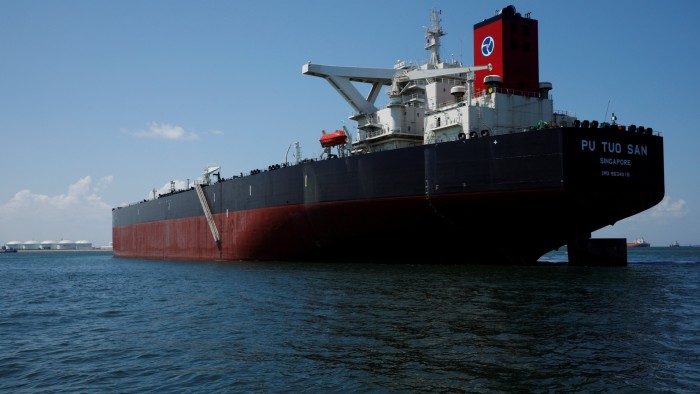[ad_1]
Unlock the White House Watch newsletter for free
Your guide to what Trump’s second term means for Washington, business and the world
President Donald Trump said China could purchase oil from Iran, in an apparent reversal of policy after his administration spent months imposing sanctions on Chinese refineries for buying Iranian crude.
“China can now continue to purchase Oil from Iran,” Trump wrote on Truth Social as he flew to The Hague for a Nato summit.
“Hopefully, they will be purchasing plenty from the US, also. It was my Great Honor to make this happen!” Trump added earlier on Tuesday.
The comments came the morning after the US president claimed credit for arranging a ceasefire between Israel and Iran, and hours after he lashed out at both countries, particularly Israel, for violating the arrangement.
On Saturday, the US bombed three nuclear sites in Iran as it joined Israel in the conflict. But Tehran’s muted retaliation — striking an evacuated American air base in Qatar — has since led to a de-escalation.
On Tuesday evening, the White House said Trump was not reversing policy but merely pointing to the results of his strikes on Iran.
“The president was simply calling attention to the fact that, because of his decisive actions to obliterate Iran’s nuclear facilities and broker a ceasefire between Israel and Iran, the Strait of Hormuz will not be impacted, which would have been devastating for China,” said a senior White House official.
The official said Trump continued to urge “China and all countries to import our state-of-the-art oil rather than import Iranian oil in violation of US sanctions”.
From March, the US had imposed sanctions on several Chinese “teapot” refineries — private groups that are the country’s main buyers of Iranian crude oil — as part of a “maximum pressure” campaign on Tehran.
It has also targeted companies involved in shipping Iranian crude to China, including Hong Kong-based entities that the US says are front companies for Sepehr Energy, a commercial affiliate of Iran’s Armed Forces General Staff. It also targeted an ageing “shadow fleet” of tankers that Sepehr uses to facilitate Iranian oil exports to China.
China buys most of Iran’s oil exports, providing Tehran with a source of income while leaving Beijing exposed to any tightening of US sanctions.
Iranian crude oil exports have risen more than threefold over the past four years, with China buying the bulk of those shipments, according to the US Energy Information Agency.
Oil prices have fluctuated wildly in recent weeks as markets weighed the impact of a fresh Middle East conflict on crude supplies — especially the threat that Tehran could close the Strait of Hormuz, a critical artery for exports from the region.
Brent crude, the international benchmark, surged above $80 a barrel on Monday in the wake of the US strikes over the weekend. But it has since receded to about $68 a barrel as traders bet on a de-escalation.
Republicans repeatedly criticised former president Joe Biden for not doing enough to crack down on Iranian oil exports to China. Trump’s comment appeared to signal a reversal after just five months in office.
When the Trump administration unveiled its first sanctions on Chinese entities in March, Treasury secretary Scott Bessent said the US was “committed to cutting off the revenue streams that enable Tehran’s continued financing of terrorism and development of its nuclear programme”.
The White House, Treasury and state department did not respond to a request for comment about Trump’s move.
Recommended
Analysts greeted the announcement with caution and said markets would take time to absorb it, given the volatility in the region.
“We’ll see if the administration follows through on President Trump’s statement by formally lifting sanctions on Iran,” said Fernando Ferreira, director of geopolitical risk at consultancy Rapidan Energy. “That remains unlikely without a deal that addresses lingering questions on Iran’s nuclear programme.”
The reversal comes as US trade negotiators are engaged in talks with China to try to resolve some of the underlying issues in the trade war between the countries. China has repeatedly criticised US sanctions, which it says are an effort to undermine the Chinese economy.
[ad_2]
Source link


